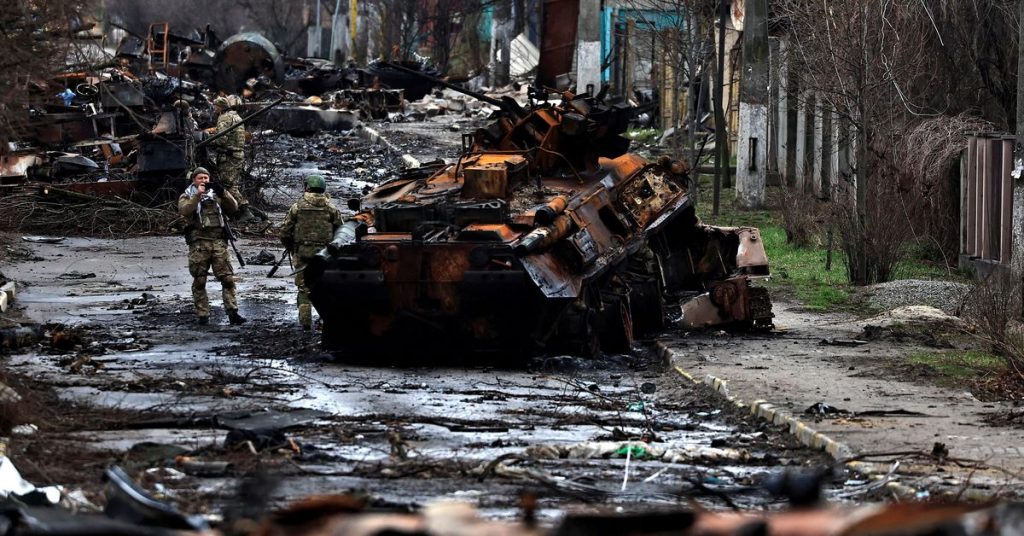Lviv/ODESA, Ukraine, April 3 (Reuters) – Ukrainian and European officials expressed outrage on Sunday at what they said were atrocities committed by Russian forces near Kyiv before they withdrew from the region to focus their attacks elsewhere.
The mayor of Bucha, 37 km northwest of the capital, said on Saturday that 300 residents had been killed during the month-long occupation by the Russian army. Reuters saw the victims in a mass grave still lying in the streets. Read more
Ukraine said on Saturday that its forces have recaptured all areas around the capital, regaining full control of the region for the first time since Russia launched its invasion on February 24.
Register now to get free unlimited access to Reuters.com
Russia withdrew its forces that had threatened Kyiv from the north to regroup to fight battles in eastern Ukraine. There was no Russian comment on the claim that the Kyiv region was entirely in the hands of Ukraine, and Reuters was unable to verify this.
Russia has previously denied targeting civilians and dismissed allegations of war crimes in what it called a “special military operation” in Ukraine.
The Kremlin and the Russian Defense Ministry did not respond to requests for comment when asked on Saturday about the bodies found in Bucha. The Defense Ministry did not immediately respond when asked about this again on Sunday.
An aide to Ukrainian President Volodymyr Zelensky said on Sunday that Ukrainian forces found the bodies of women who had been raped and set on fire, as well as the bodies of local officials and children.
“There are dead men who had signs of torture. Their hands were tied and they were shot in the back of the head,” Oleksiy Aristovich told Ukrainian television.
“I have to be very careful with my wording, but it looks exactly like war crimes,” Zelensky’s spokesman, Sergei Nikiforov, told the BBC.
Senior European officials said any possible war crimes should be investigated.
“Shocked by the news of the atrocities committed by Russian forces. The EU helps Ukraine document war crimes,” Josep Borrell, the EU’s foreign policy chief, said on Twitter, adding that all cases should be pursued by the International Court of Justice. Read more
British Foreign Secretary Liz Truss said there was “growing evidence of horrific acts by invading forces in cities such as Irbin and Bucha, and said London would fully support any investigation by the International Criminal Court.”
missile strikes
Missiles struck near the southern Ukrainian port of Odessa on Sunday and Russia said it had destroyed an oil refinery used by the Ukrainian military.
A soldier poses for a photo of his comrade standing next to a destroyed Russian tank and armored vehicle, amid the Russian invasion of Ukraine in Bucha, in the Kyiv region, Ukraine, April 2, 2022. REUTERS/Zahra Bensemra TPX IMAGES OF THE DAY
In Odessa, the city council said “critical infrastructure facilities” had been bombed. There were no reports of injuries.
The Russian Defense Ministry said its military strikes destroyed an oil refinery and three fuel storage facilities near Odessa. It added that the facilities were used to supply Ukrainian forces near the city of Mykolaiv.
Odessa, located on the Black Sea, is the main base of the Ukrainian Navy. He was targeted by Russian forces seeking a land passage into Transdniestria, the breakaway Russian-speaking province of Moldova that hosts Russian forces.
Dmytro Lunin, governor of the central Poltava region, said the Kremenchug oil refinery, 350 km northeast of Odessa, was destroyed in a separate missile attack on Saturday. Read more
Two witnesses told Reuters that two explosions were heard in the Russian city of Belgorod near the border with Ukraine on Sunday, days after Russian authorities accused Ukrainian forces of bombing a fuel depot there. Read more
Evacuation, peace talks
Evacuation efforts were to continue in Mariupol and nearby Berdyansk, both on Ukraine’s southern shores, with a convoy of buses being outfitted with the help of the Red Cross.
The ICRC abandoned its previous attempts for security reasons. Russia blamed the ICRC for the delay. Read more
Mariupol is Russia’s main target in the Donbass region of southeastern Ukraine, and tens of thousands of civilians there are trapped with difficult access to food and water. Read more
There was little sign of a breakthrough in efforts to negotiate an end to the five-week-old war, although Russia’s chief negotiator Vladimir Medinsky said talks were due to resume on Monday.
Medinsky said the draft agreement was not ready for any meeting between Russian President Vladimir Putin and Ukraine’s Zelensky. Read more
On Saturday, Ukrainian negotiator David Arachhamiya raised hope for negotiations with Russia, saying that sufficient progress had been made for direct talks between the two countries.
Medinsky said that while Ukraine was showing more realism by agreeing to be neutral, giving up nuclear weapons, not joining a military bloc and refusing to host military bases, there was no progress on Russia’s other key demands.
“I repeat again and again: Russia’s position on Crimea and Donbass remains unchanged,” he said via Telegram, adding that video talks would continue on Monday.
Russia annexed Crimea from Ukraine in 2014 and recognized declarations of independence by the self-proclaimed republics of Luhansk and Donetsk in the Donbass region of eastern Ukraine that revolted against Kyiv’s rule.
Register now to get free unlimited access to Reuters.com
Additional reporting by Simon Gardner, Zahra Bensemra and Abdelaziz Boumzar in Bucha and Ukraine Natalia Zenets in Mukachevo, Ukraine, Guy Faulconbridge and Paul Sandel in London and Sabine Siebold in Berlin and Reuters office. Editing by William Mallard and Francis Kerry
Our criteria: Thomson Reuters Trust Principles.

“Writer. Evil travel maven. Avid creator. Proud beer expert. Music lover. Explorer.”











More Stories
Jake Sullivan meets Yang Jiechi in Luxembourg, paving the way for a possible meeting between Biden and Xi
The CDC adds 3 places to its “high” risk list, including Mexico and the United Arab Emirates
Wordle 359 June 13 – Struggling with Wordle today? THREE CLUES TO HELP ANSWER | Games | entertainment